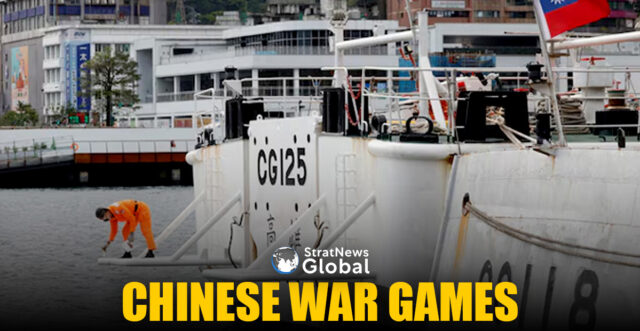China may use a “pretext” to conduct new war games around Taiwan this year, potentially aligning them with sensitive dates like the May anniversary of President Lai Ching-te’s first year in office, a senior Taiwan coast guard official warned.
China, which views democratically governed Taiwan as its own territory, regularly holds exercises around the island, including one begun on Tuesday, it said was to “serve as a stern warning and powerful deterrent against Taiwanese independence”.
However, China did not give a name to those drills, unlike two war games last year that it dubbed “Joint Sword-2024A”, held in May, following Lai’s inauguration, and then “Joint Sword-2024B” in October, after his national day speech.
Chinese Pretext
Beijing’s pretext could include “special occasions” such as diplomatic events or incidents related to Taiwan’s sovereignty, Hsieh Ching-chin, the deputy head of its Coast Guard Administration, told a small group of reporters.
He added there were two key dates this year around which China could either launch named war games – “Joint Sword-2025” – or what he called “de facto” drills.
Apart from the May anniversary, these included October, around the time of Taiwan’s national day when Lai gives a keynote speech, and August, when China ends a routine annual ban on fishing, ostensibly to protect fish stocks, Hsieh said.
Neither China’s defence ministry nor Taiwan Affairs Office responded to requests for comment on the likelihood of such war games.
‘Grey Zone’ Pressure
A separate source, a senior Taiwan security official, said the assessments were based on past experiences and Chinese actions, adding that China this year could seek “excuses” to hype up its “grey zone” pressure on Taiwan on those sensitive dates.
Beijing faces a “dilemma”, however, in balancing its grey zone aggression on Taiwan while avoiding blowback internationally, the official added.
“On one hand, they want to exert extreme pressures on Taiwan, but on the other hand, they must be extremely careful not being labelled as an aggressor internationally.”
The coast guard is heavily involved in Taiwan’s response to Chinese military drills and civilian “grey zone” activities such as illegal fishing in its waters, and coast guard ships now support the navy in shadowing Chinese warships during drills.
In case of war, the coast guard would be pressed into service and ships armed to help defend against a Chinese attack.
Hsieh said Taiwan has been alarmed by a recent uptick in Chinese activities around the Pratas Islands, an atoll controlled by Taiwan and protected as a marine reserve that lies strategically at the top part of the South China Sea.
China also claims the Pratas, as it does most of the busy waterway, and its coast guard ships have entered the atoll’s restricted waters several times this year, denounced by Taiwan as “coercive harassment.”
China’s coast guard has no publicly available media contacts.
Outlining a new response strategy, Hsieh said the coast guard will evaluate the Philippines’ “transparency” policy to give details on China’s actions to draw greater international attention.
(With inputs from Reuters)





